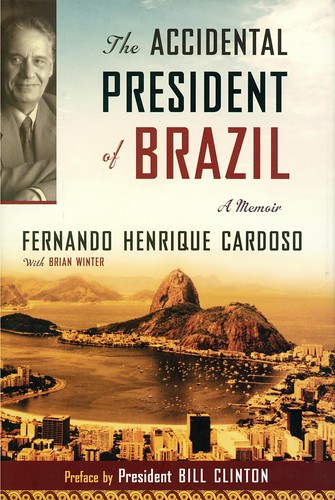This breezy political autobiography is a nice introduction to recent Brazilian history, if you can stomach FHC’s false humility. It forms a nice addition to A Death in Brazil by Peter Robb, which examines closely the corruption of the Collor presidency.
I rather wish Cardoso had given more details of his career and recent Brazilian history, and he was too nice by far. But he gives a useful view of modern Brazil. The Prestes Column and the revolt of São Paulo in 1932 are given as examples of how tenuous the rule of the federal government of Brazil was. And the inability of Brazil to effect normal changes of government in the 50s and early 60s was given as a profoundly Brazilian weakness. This has been something I believed ever since the first Angolan elections after the end of the civil war there. It’s not the first democratically elected president of a country that matters, but the second or third. It’s when transition doesn’t cause a crisis that democracy can be said to be sustainable. He also talks about how decisions made by Portugal in the 16th century (offering enormous land grants to settlers) have fed into the endemic inequality of today. This kind of commonsense observation helps one make sense of Brazilian history.
After the military finally gave up power in Brazil, they essentially handed power over to Tancredo Neves. Neves, however, died before he could take office. Neves was a fairly independent politician who was acceptable to the pro-democracy forces. The military had forced them to accept José Sarney as his running mate. Sarney was seen as the military’s man. So in 1985, Sarney became the first non-military president of Brazil since the early 60s. The military had left Brazil in sorry shape, suffering from hyper-inflation and many other ills. Sarney failed to improve the situation—indeed, the inflation just got worse. Even then, Lula was a major figure, appearing on the covers of major newsmagazines, and scaring folks with the possibility that his leftish Partido Trabalhadores would gain power. This is why they elected Collor in 1989, who painted himself as an outsider there to remove the “maharajahs” of government. Like almost all Brazilian candidates, he actually came from an elite, politically connected family. His pathetic story is told in gruesome detail in Robb’s book. Not only did Collor not solve Brazil’s inflation problem, he stole millions if not billions.
Meanwhile, Cardoso was slowly progressing politically. He is at pains to claim he had no political ambition, and maybe he doesn’t see it. But he was clearly destined for politics from an early age—his father and grandfather were politically active—and when he was forced into exile by the military regime, he was instantly politicized. So even though he was a practicing sociologist and professor (writing a key text on underdevelopment), he was always involved in the struggles to reassert democracy—and that meant being in politics.
He was a senator when Collor’s successor (and vice president) Itamar Franco hired him to be foreign minister, Franco seemed ill-suited for the presidency—like Sarney, he had been inadvertently thrust into the job and had to deal with crisis from day one. After three failed finance ministers, he brought in Cardoso. At this point, Cardoso accomplished one of the great economic/political feats in modern history—he introduced a new currency (a common occurrence in Brazil) and tamed inflation.
Now the most unbelievable part of the book is when he says he ran for president because he was afraid Lula would win. If he had said to preserve the Plan Real, I would have believed it. But Lula was too radical to win. Even though Cardoso and Lula had been close during the last years of the military when the fight for democracy was happening, Cardoso was a “third way” free-marketer and Lula was a nationalize-everything socialist. Cardoso rightly thought Lula’s plan was backwards, especially as command economies were collapsing all around the world.
So Cardoso ran and won, twice, both times against Lula. He had already done his heroic thing. He says, “My presidency was, at its most basic level, about trying to turn Brazil into a stable country.” That’s what he accomplished during his presidency. His biggest crises were the worldwide debt crisis in the late 90s and AIDS, and he acquitted himself pretty well. And after he was term-limited out, an older, mellower Lula finally won (his fourth try). And while Lula’s government has appeared to tolerate an unacceptable level of corruption, he has been a steady leader, fiscally reasonable, and a counterweight to the semi-radicals elected in Venezuela and elsewhere.
Cardoso is charming, and this book worth reading. Perhaps it’s too much to ask for more detail, more economics, more nitty gritty politics, more detail. But still I wish it had them.


0 Comments:
Post a Comment
Subscribe to Post Comments [Atom]
<< Home